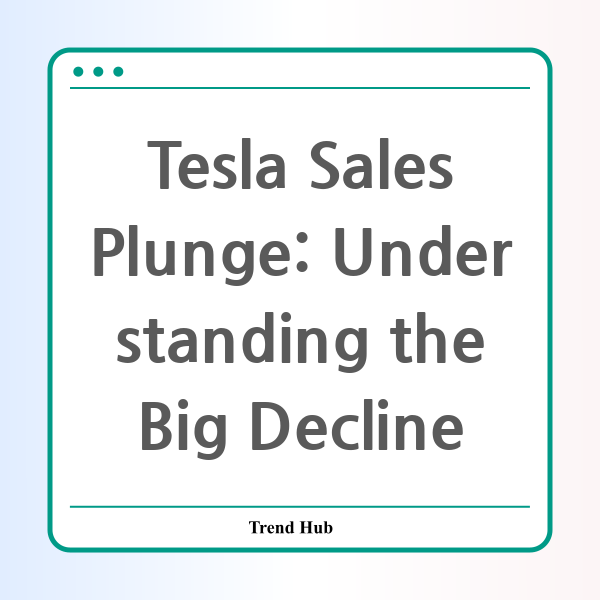* This website participates in the Amazon Affiliate Program and earns from qualifying purchases.

Is Tesla's reign in the electric vehicle (EV) market coming to an end? Recent sales figures suggest a concerning trend for the iconic automaker that could reshape the landscape of the EV industry. Tesla's history of continuous growth has taken a significant hit, with a reported 13% plunge in sales during the first quarter of this year, marking the largest decline in deliveries in its history. As Tesla tries to navigate a barrage of challenges, from CEO Elon Musk's political controversies to intensified competition in the EV market, it is time to delve deeper into the factors driving this decline.
In the first three months of the year, Tesla managed to deliver 336,681 vehicles, down from 386,810 during the same quarter last year. This staggering drop of 50,000 vehicles reflects not only poor performance but also the company's worst quarterly results in nearly three years. Analysts had cautiously anticipated a decline, but projections remained optimistic with estimates hovering around 350,000 deliveries. The reality, however, fell short of expectations.
Among the factors influencing Tesla's downturn are protests against Musk and other socio-political issues. As he balances his role leading the company and serving as the head of the Department of Government Efficiency, the backlash from his political stance has led to protests outside Tesla showrooms. These demonstrations appear to have discouraged potential buyers, contributing to the decline in sales. Furthermore, vandalism incidents against Tesla facilities, including charging stations, indicate a growing sentiment against the brand, further complicating the challenges it faces.
Notably, the political controversies surrounding Musk are particularly pronounced in Europe, where Tesla's sales have plummeted by nearly 49% in the first two months of the quarter. Despite overall EV sales growing by 28% on the continent, Tesla is struggling to maintain its foothold amidst rising competition and strong opposition to its CEO's affiliations with far-right parties in Germany and the UK.
Even more troubling for Tesla is the steep rise in competition from Chinese automakers like BYD, which has recently overtaken Tesla in quarterly EV sales. In the same timeframe, BYD reported delivering more than 416,000 pure electric vehicles, a staggering 39% increase compared to the previous year. With sales trends suggesting that BYD could potentially eclipse Tesla in full-year sales by 2025, the pressure is mounting.
Tesla's stock has reflected this downward trend, with shares dropping nearly 44% since their all-time high realized just before Christmas. Following the recent sales report, stock prices tumbled another 5% in pre-market trading, signaling investor concerns about the company's long-term growth trajectory. While Tesla produced 362,615 units globally, the decline in registration numbers across its key markets, including France, Norway, and Denmark, serves as a stark reminder that the brand's appeal may be waning.
Moving forward, Tesla's leadership must navigate these turbulent waters carefully. As industry analysts highlight the need for Musk to clarify his dual responsibilities and mitigate risks associated with his political activities, the company faces a pivotal moment in its storied history. The question remains – can Tesla adapt and realign itself to reclaim its position as a market leader in the evolving landscape of electric vehicles?
In conclusion, while Tesla's recent sales plunge may seem daunting, it also presents an opportunity for the company to reassess strategies, strengthen brand loyalty, and innovate further in the competitive EV space. For stakeholders and Tesla enthusiasts alike, only time will tell how the company will respond to these challenges and what the future holds for electric vehicles worldwide.
* This website participates in the Amazon Affiliate Program and earns from qualifying purchases.